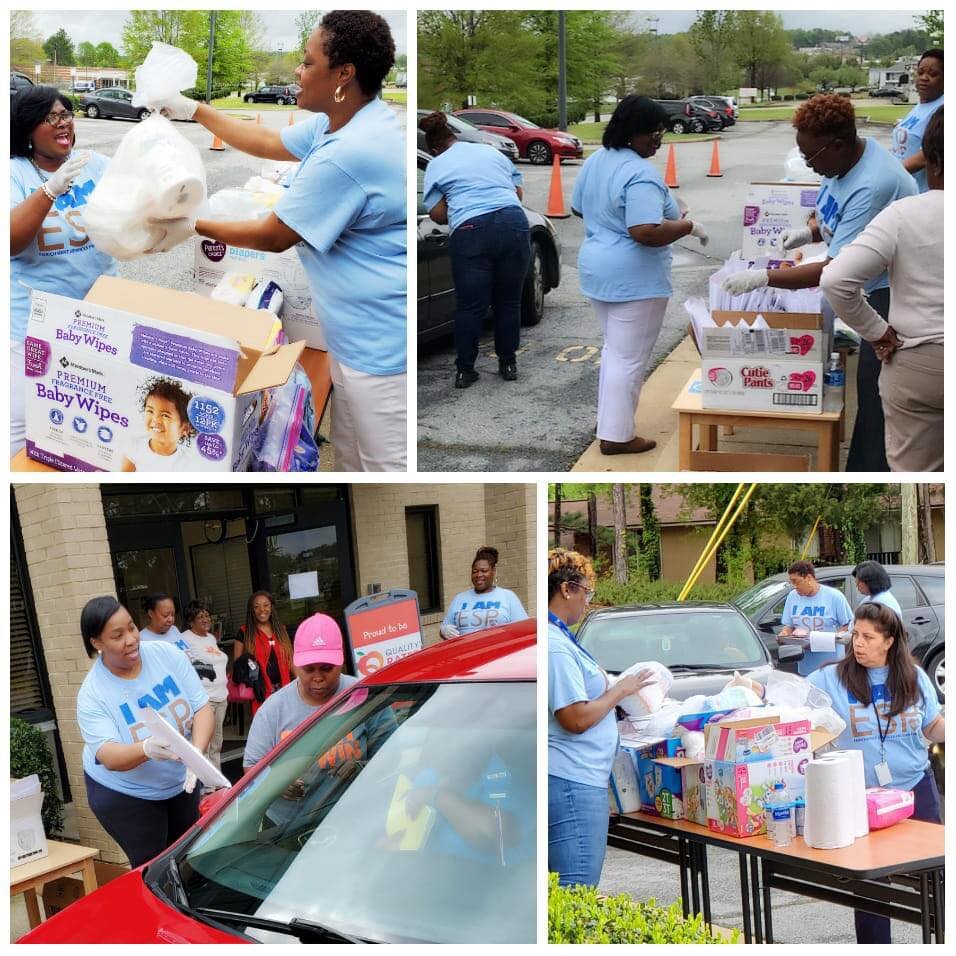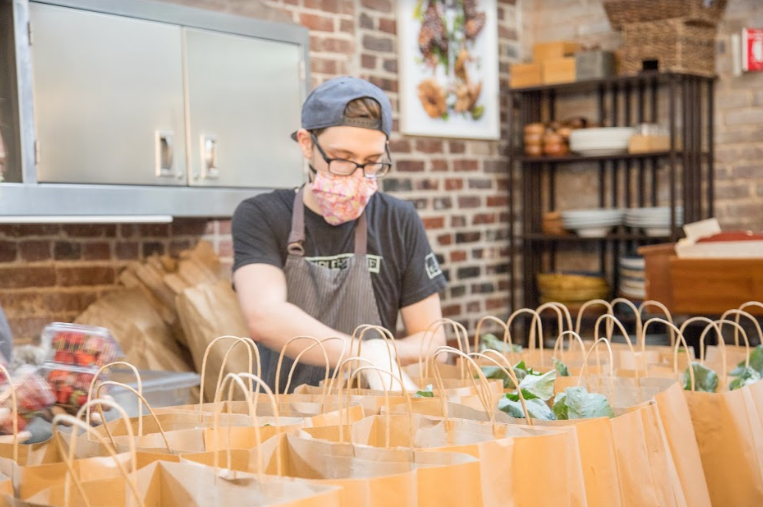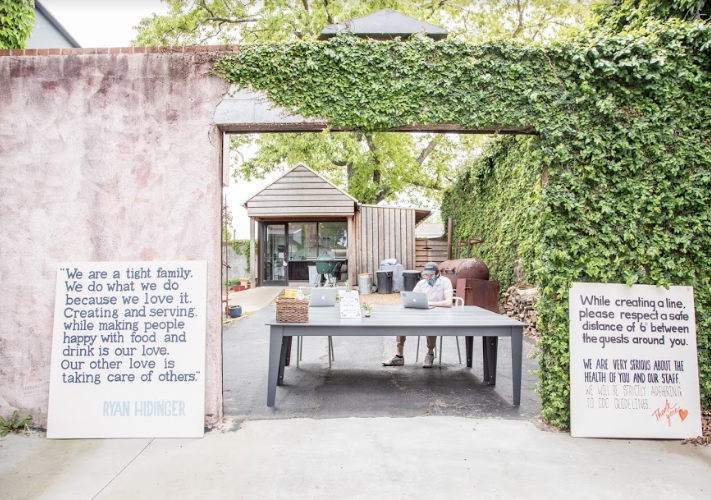By Caroline Croland
Georgia Food Oasis seeks to convene and engage local leaders to address their community’s food access issues.
Now more than ever, these local markets and good food organizations are providing essential access points to food insecure communities across Georgia during the COVID-19 pandemic.
The Georgia Food Oasis (GFO) is a growing network of towns and cities that recognize food is a powerful tool for driving positive change in their communities. GFO is a designation that seeks to recognize local food coalitions who are working to improve access, supply, and consumption of healthy local food.
In May, the program awarded $22,700 in mini-grants to 10 recipients dedicated to serving the rapidly shifting needs of their communities bought on by the COVID-19 pandemic by mobilizing the distribution of locally-farmed food.
Suzanne Girdner, Georgia Organics Community Outreach Manager, leads the program and says of the Mobilizing Food Funds Mini-Grant funding:
“What I am still processing about this latest grant round is just the tremendous amount of need that the communities were seeing firsthand and trying to figure out how to respond as best we could. The level of gratitude and care that they have taken for their neighbors and residents — it really impresses me.
These organizations from across Georgia provide innovative solutions to food scarcity caused by the pandemic. In doing so, they have made it a priority to actively shift the emergency food relief paradigm away from providing only shelf stable, prepackaged food towards fresh, nutrient dense fruits and vegetables sourced from local farms.
It is incredible to be able to work alongside somebody and say ‘I recognize how hard you're working, and we want to support you,’ and we can do that in a material way.”
Georgia Food Oasis began in 2016. One of the fiscal goals of the program is to provide small grants for coalitions and residents within communities. These non-traditional funds allow residents to respond in real time to community needs without being over burdened by a tedious application process.
The Mobilizing Food Funds Mini-Grant Awardees are listed below, where you can learn more and connect with the amazing work they’re doing within their communities.
To learn more about the Georgia Food Oasis, visit gfo.georgiaorganics.org/.
MOBILIZING FOOD FUNDS AWARDEES
SAVANNAH ($5,000)
1. The Farm Truck 912, Forsyth Farmers Market is a mobile market that brings locally sourced produce to Chatham County’s low income, low food access neighborhoods. Funds will also assist in piloting a new home delivery service for elders and differently-abled individuals, who are among the most food insecure members of the community. A portion of the funds will help with increased personnel hours, materials, and sourcing from 25 whole food vendors.
2. Fresh Food Express, The YMCA of Coastal Georgia is part of Healthy Savannah’s CDC REACH strategy YMCA and hosts a bi-monthly produce donation market which has nearly doubled participants since the pandemic. Funds will be used to assist with sourcing fresh food from regional growers for 600 residents in a newly adapted drive-thru market.
The Farm Truck 912, Forsyth Farmers Market.
Fresh Food Express, The YMCA of Coastal Georgia
WAYCROSS ($2,500)
WayGreen, Inc. in Waycross
WayGreen, Inc. provides healthy locally produced food to people living in the region of Southeast Georgia. The market has transitioned to a weekly online market with participating farmers from 6 surrounding counties. Funds will go towards supporting transportation needed to source from a larger more rural region between Nashville and Brunswick, GA. Plans include retrofitting a trailer for cold storage transport and safe storage at market. A portion of the funds will also assist with the additional personnel hours in coordinating weekly logistics with 18+ regional farmers.
AUGUSTA ($4,900)
1. Augusta Locally Grown is an online market that supports small farmers by making locally grown produce available for sale to the surrounding Augusta community. The online market has nearly quadrupled in sales and pick up locations are having to adapt to handle the influx of orders. These funds will be used to help open new pick-up site at Ft. Gordon, and new markets in Columbia and Warren counties, and will increase sales of the 40 farmers that the ALG market supports.
2. The Veggie Park Farmers Market serves a low income, low food access neighborhood, Harrisburg in downtown Augusta. After a postponed opening the market is reopening with advanced precaution due to a higher elderly and at-risk population in the neighborhood. Funds will assist with adapting the market, piloting home delivery, and offsetting additional personnel hours needed to safely serve the neighborhood. This market directly supports 15+ farmers.
COLUMBUS ($2,500)
MercyMed Farm is an urban farm at MercyMed in the North Highland neighborhood of Columbus. The farm has been giving away all of their farm-grown produce to neighbors who are experiencing food insecurity and transportation issues, exacerbated by the pandemic. Previously the farm ran weekly markets and a farm stand but shifted to donation due to resident needs. These funds will be used to offset loss of some income assist with providing fresh fruits and vegetables to community members in need during this time.
MercyMed Farm
ROME ($5,300)
1. Between the Rivers Farmers Market is organizing a drive-thru and/or contactless market for its community in Rome. These funds will specifically help the market improve visibility in the community with additional signage.
2. The South Meadow Farm at the Davies Shelter will start supplementing donation food boxes of non-perishable items with 5 lbs of produce beginning in June. Funds will assist in providing produce to 400 boxes.
The South Meadow Farm at the Davies Shelter
The Farm Bus at Davies Shelter
3. The Farm Bus at Davies Shelter was originally intended to serve the surrounding neighborhood of the Shelter as a mobile market, it has expanded since the pandemic to serve five additional neighborhoods and clients for partners Salvation Army and The Community Kitchen. Funds will be used to assist with additional operational and logistical expenses.
WALTON COUNTY ($2,500)
The Mobile Farmacy Market, Walton Wellness is a free member-based market for financially-burdened families in Walton County. Due to the pandemic, they are 100% dependent on their garden, community garden donations and a local farm where they purchase eggs. These funds will go towards sourcing from local farms to provide produce to the community through the Mobile Farmacy.
The Mobile Farmacy Market, Walton Wellness
Caroline Croland is the Fundraising Coordinator at Georgia Organics. To learn more about Georgia Organics, visit www.georgiaorganics.org and follow us on Instagram @GeorgiaOrganics, Twitter @GeorgiaOrganics, and at www.Facebook.com/GeorgiaOrganics.














































